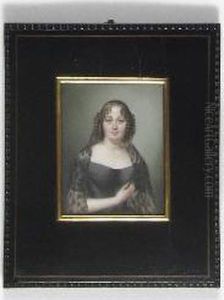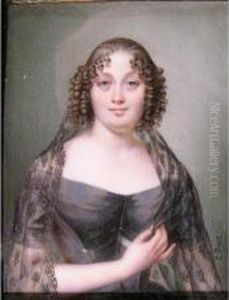Leonard Poyet Paintings
Leonard Poyet, a name that may not immediately resonate with a broad audience, was a French artist whose life and career were tragically cut short by the events of World War I. Born in 1888, Poyet emerged from a period rich in artistic innovation and upheaval, a time when art in Europe was undergoing radical transformations. Despite the brevity of his career, his contributions, particularly in illustration and graphic arts, provide a window into the stylistic transitions and cultural preoccupations of early 20th century France.
Poyet's work is characterized by its elegance and precision, reflecting the influence of Art Nouveau and the burgeoning movements that would eventually give rise to modernism. Though not as widely recognized as his contemporaries, his illustrations and designs capture the spirit of an era that was increasingly fascinated with the interplay between art, technology, and society. Poyet's artistic output includes posters, book illustrations, and postcards, which were popular mediums for art distribution in his time. Through these works, he demonstrated a keen eye for detail and a distinctive style that blended traditional motifs with emerging artistic trends.
The outbreak of World War I in 1914 dramatically altered the course of Poyet's life and career. Like many artists of his generation, he was swept up in the patriotic fervor of the time and enlisted in the French army. His service to his country, however, would prove to be brief. Leonard Poyet died in 1916, at the age of 28, leaving behind a modest but compelling portfolio of work. The war claimed the lives of many young talents of the era, and Poyet's early death is a poignant reminder of the cultural and human losses sustained during those tumultuous years.
In the years following his death, Poyet's work has been revisited by art historians and collectors alike, who have sought to shed light on the contributions of lesser-known artists to the rich tapestry of early 20th century art. His illustrations, with their delicate lines and thoughtful compositions, continue to enchant viewers and serve as a testament to the artistic potential that was so abruptly extinguished by war. Despite the brevity of his life and career, Leonard Poyet's legacy endures, offering insight into the vibrancy and dynamism of pre-war French art.

